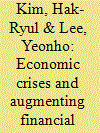| Srl | Item |
| 1 |
ID:
158638


|
|
|
|
|
| Summary/Abstract |
Despite negative public opinion, the role of the Korean government has expanded, while overcoming two rounds of global financial crises. The phenomenon of the re-swelling state is mainly attributed to the strengthening of the central bureaucracy, in particular the financial bureaucracy, rather than the whole central government or the state. The argument of the strengthening of the ‘state’ or the ‘government’ after economic crises might be subject to the error of generalization. Through the two rounds of economic crises, the financial bureaucracy succeeded in acquiring the authority of market supervision and industrial support. In consequence, the bureaucracy's institutional supremacy within the government grew less challenged. The central bureaucracy was no longer the loyal servant to the President. It has reinforced its institutional strength and autonomy vis-a-vis the President, the National Assembly, the Central Bank and civil society, under the pretext of building up the rational and autonomous market and democratic politics.
|
|
|
|
|
|
|
|
|
|
|
|
|
|
|
|
| 2 |
ID:
103698


|
|
|
|
|
| Publication |
2011.
|
| Summary/Abstract |
The debate over the political power of business has witnessed a revival after the global financial crisis of 2007-2009. We begin by arguing that business political fragmentation or unity has important consequences for policy outcomes. The structure of the U.S. government is conducive to incremental policy changes, often in response to business pressures. In turn, these changes shape the political interests and alliances of business. We illustrate this dynamic through an analysis of the political processes leading to the enactment of the Financial Modernization Act (FMA) of 1999, which repealed Depression-era regulations and allowed commercial banks to enter the securities and insurance business and vice versa. The FMA condoned the emergence of largely unregulated diversified financial institutions, which proved "too big to fail" during the crisis. Several factors contributed to the FMA: political institutions, international competition, the ideological convergence of the Republican and Democratic parties, and the political interests of financial industry actors.
|
|
|
|
|
|
|
|
|
|
|
|
|
|
|
|
| 3 |
ID:
102694


|
|
|
| 4 |
ID:
102697


|
|
|
| 5 |
ID:
132683


|
|
|
|
|
| Publication |
2014.
|
| Summary/Abstract |
The deepwater horizon accident may have shaken the sustainability ratings and indices credibility, but it also reinforced their importance. The objective of this article is to contribute to the improvement of corporate sustainability valuations by investigating if reserves profiles can affect the environmental risk exposure of an Oil & Gas (O&G) corporation. Data on reserves from 2009 to 2012 of 24 listed O&G companies were used to test six hypotheses, addressing how these profiles could relate to the four material environmental risks: climate change, accidents, sensitive area/access, water. The frequency with which companies reported these risks was evaluated using key word in context (KWIC) content analysis. Analysis of variance (Anova) and Student×s t tests were applied to each of the hypotheses. This study shows environmental risks are embedded with the oil and gas reserves. We found the following relationships: (1) companies with heavy oil reserves report more exposure to climate change risks, particularly emissions control; (2) water is more of an issue with companies with higher bitumen and natural gas reserves; and (3) there is significant regional bias in the reporting of the environmental risk factors. These findings have broad implications for the financial industry, governments, investors and lenders alike.
|
|
|
|
|
|
|
|
|
|
|
|
|
|
|
|